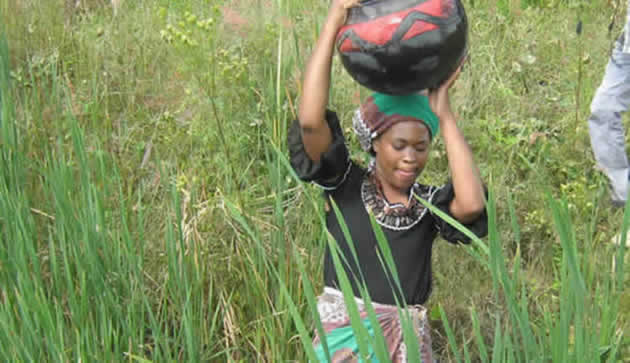Every man’s superwoman


Becoming a muroora does not mean a woman must stop being someone of value as culturally a woman is regarded as the root of a family
Blessing Musariri Shelling the Nuts
The other day I realised that I seem to have spent an inordinate amount of time in a car with my father. Most of the time I would moan and groan about it when I was picked to be the driver, but I realise now that it was probably the only one-on-one time we ever got.
Admittedly, he did most of the talking, including plenty of ‘back-seat’ driving, and I thought I was just internally rolling my eyes and pulling an “in one ear, out the other”, but now that he is gone, I am surprised at how much I remember of what he said.
It was on one of those drives, this time, around a field he wanted to inspect, when he said to me, “Mwana wangu, don’t feel it is necessary to get married. Build a good life for yourself and be happy. I hate to see my daughters being treated badly by other people.”
This did not surprise me because he had long been a great proponent of higher education and personal achievement no matter your gender. However, he was also very conflicted. He was at heart, a traditional African man, but he was also a progressive thinker of great vision raising more than a handful of daughters. He always said to us that we should be able to do everything within our capabilities to help ourselves move forward with our lives and that we should never have to depend on a man for anything more than love and support.
At the same time as women we were fully expected to make sure meals were on time and that the household was taken care of. Many were the days I left home for work with both my father and my brother and when we returned home together they would sit back and relax and wait for me to deal with making supper magically appear and the remnants disappear. I used to grumble mightily but I got it done, because this is what we do, we are Superwomen, we are every man’s Superwoman and yet we seem to always fall last on the list.
I’m all for culture as a means of identity and belonging but some things just don’t sit well. Maybe these aspects of culture are abused and practiced according to personalities rather than according to intended function and form and that’s what makes them unpalatable or maybe they just are no longer relevant and applicable in modern society. I’m talking particularly about becoming a muroora.
When you are married, as a woman, you are considered by your husband’s family as mutorwa — one who is taken from somewhere else, not part of the original family, a stranger. But of course you came from somewhere, they didn’t just find you wandering in the wilderness having dropped from the sky, waiting for their largesse. You came into that family, leaving your own family — who love and care about you as much as your husband’s family loves and cares about him — and you took your husband’s last name and became part of his family.
Historically, people generally lived together in large homesteads and extended communities and everyone had an integral role to play in order for the smooth running of daily living and as a woman now married into a man’s family, you physically transplanted yourself from your homestead to become a part of your husband’s greater homestead and thus part of the clan. In this clan, you would be given your part to play in order to keep a kind of harmony in the whole set up and I suppose it worked, or otherwise it was accepted for what it was, because the bigger picture was more or less organic.
What has now emerged from this original setup in our time is that muroora basically translates to “on-call service provider”, whose needs and happiness are her own business when she has the time for them — and she is also supposed to stay looking fabulous so as not to push her husband into the arms of a better preserved competitor. I cannot speak for how it was, in reality, for my mother and her mother before that but it sounds like varoora may have been better appreciated or perhaps my mother was just lucky to have had a strong and supportive matriarch as her mother-in-law. Speaking on what I have observed over the years what I can say with certainty is that the current way of doing things makes no sense to me. Becoming a muroora does not mean you stop being someone of value — valuable to yourself and to other people outside the family. Valuable to your husband and to your children — of the utmost value to them in particular. As my aunt once said at a kitchen tea party, “The word mudzimai begins with the word mudzi, which means root . . .” A woman is the root of a family, without her, there is just a man and his brothers, and where do they come from? Chicken or the egg?
Once, when one of my superwoman sisters was truly angry with her son who was being disrespectful, she said to him, “If you continue with that behaviour I will lift up my skirt and show you exactly where you came from”. That shocked him back to more sensible behaviour. And like this, women are that important and that powerful, so how come when you cross over and give a man, your heart and your body, his family feel entitled to your soul as well simply because you have taken their name?
Do you stop being someone’s beloved child with a family of her own? Do you stop being a person with needs and hopes and dreams of their own? A friend of mine from a culture similar to ours once jokingly said, “Eish! In this family (her husband’s) I come last after even the help, who have been here since my husband was a child. Even they do not respect me.” How do you become the donkey that carries everybody’s monkey on your back simply because you made the mistake of falling in love and wanting to start a family of your own? This is not what you imagined when your man proposed and said, “Will you marry me, will you be my wife?” You thought, finally I am going to leave the authority of my parents home and go and start a home and family of my own where I will be the authority to my children, I will be the matriarch in my home and my husband and I will build a good life together. Instead you find that you have essentially made yourself a potentially stateless broodmare. You have left the protection of your own home to enter a territory that will never be completely hospitable to you and you try as best you can to fit in with a people who will never consider you truly one of them because of course you’re not, you keep your totem and even though they now own you body and soul, you are still not one of them. Your family tell you that you are now a So and So and have a new family and even before that you were basically just a temporary holder of your family’s name. And what is worse, your children are not yours.
When things fall apart and you can no longer cope and you finally leave, you are affiliated with your husband’s family by name, you are affiliated with your own family by birth, you are neither here nor there and therefore, essentially stateless. (No one wants to be a stateless, retired broodmare and so many people do not leave at all because it is cold ‘out there’.) Of course you can return to your family, but the damage is done and you have to fight to reclaim your soul. As another of my sisters in arms said, “I am no longer a So and So but my family to whom I have returned keep calling me Mai (mrs) So and So because they say I am now of another village by virtue of joining blood but I was never quite a So and So, I was always still me, so where do I belong now? I shall simply call myself, First Name Mwanawashe (child of God) because at the end of the day, that is my only true home.”









Comments